You need me, a peaceful journey to the end of life
【Volunteer】
Interview/Liu Xiaolin
Interviewed and photo provided/Su Zhaorong
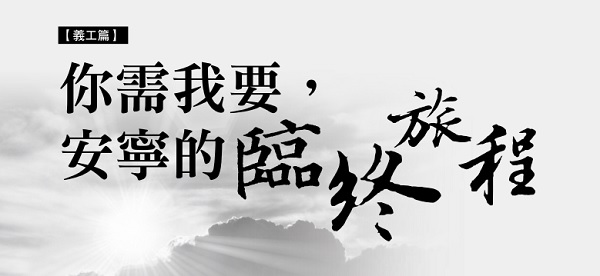
Two bereavements
In the autumn of 2002, Su Zhaorong's mother suddenly fell seriously ill and lost the ability to walk, write, etc., and her mood fluctuated greatly. At the same time, Zhaorong's ex-husband was filing for divorce. Zhaorong was exhausted from taking care of her mother and four-year-old son Eric every day. Only five months after the onset of the disease, my mother passed away. In addition to being sad, Zhaorong regretted not being able to take good care of her sick mother with empathy. She was also angry about the incompetent medical care and poor treatment. This mess of emotions had been weighing on her heart for nine years.
Zhaorong also had a more poignant experience. During her third pregnancy, her long-awaited daughter was born prematurely. She was underweight and could not digest milk properly, so her growth was severely delayed. My daughter had intravenous drips, blood draws, and many needles all day long, and not a single piece of skin on her body was intact. One day after her daughter was pushed into the operating room, Zhaorong heard shrill wails coming from inside, which broke her heart. After that day, my daughter never made a sound again. After careful study of her blood test report that day, one index was extremely high, showing that she experienced unusually severe pain at that moment.
My daughter passed away when she was ten months old. Doctors had previously announced that there was no cure, but in order to find out what disease her daughter had, Zhaorong also hoped that a miracle might happen and found a good way to rescue her. Unexpectedly, the child suffered a lot of pain. Today, these pains are still deeply engraved in Zhaorong's heart, so painful that she is suffocating.
At that time, if Zhaorong had known the essence of "peace care", her experience might have been different.

▲Su Zhaorong’s loving mother took a photo with Zhaorong’s younger sister and son Eric two months before her death. Zhaorong's experience of accompanying her mother made her more empathetic and loving critically ill patients and their families who are fragile in body, mind and soul.
Enter hospice care
Zhaorong has always been a busy single mother. After her son entered middle school, she had more time and wanted to serve the community more. A preacher recommended her to volunteer at the American-Chinese Compassionate Care Alliance (hereinafter referred to as "American-Chinese").
While participating in the 30-hour intensive training at Meihua, God ignited the passion for the life given by God in Zhaorong's heart, allowing Zhaorong to accept the call and embark on the path of hospice care.
In the past five years, Zhaorong has accompanied many terminally ill patients through a unique final journey, helping patients and their families renew their relationships and deepen their affection in the midst of pain. She has also participated in more than 20 activities related to palliative care education, peace-of-mind teahouses, etc., constantly arousing people's attention to issues related to the end of life.
"Four Paths" of Life
Zhaorong was shocked when she received the news about the first patient assigned to her care. The patient actually lived in the nursing home where her mother had lived before she passed away! Although Zhaorong could not accept this arrangement, she knew that it was from God to completely sort out her past life.
Zhaorong was afraid of getting hurt. However, nine years later, the appearance of the nursing home had changed.
The patient was ninety-two years old, had severe heart disease, and was expected to live only six months. The ward is decorated like a home. The old lady always likes to sit on the comfortable sofa chair and tell her love history. Seeing that Zhao Rong was fascinated by it, she repeated her old stories again and again. This made Zhaorong realize that terminally ill patients usually like to talk about themselves. If volunteers can be good listeners, they can eventually win the hearts of the patients. For those patients who are not talkative, having someone by their side is comforting.
Zhaorong often brings small gifts to the old lady, and she doesn't forget to send flowers on Mother's Day. The old lady lent her books to Zhao Rong to read, just like giving homework in advance. She looked forward to talking about books with Zhao Rong next time, and Zhao Rong read them all. The "student" was so serious, which made the old lady very happy. In a beautiful relationship, the old lady's body, mind and soul were taken care of, and her health improved and she lived two more years.
Every patient is unique. Every time she comes into contact with a new patient, Zhaorong tries her best to understand the patient so that she can find a suitable companionship method for the patient and provide thoughtfulness and care.
There was a patient whose body was covered with tubes. To prevent extubation, the nurse tied her wrists tightly to the bed rails. The patient was very uncomfortable and begged Zhaorong, "Help me loosen it." Zhaorong helped her convey her wishes to the nurse, but the nurse did not agree. Zhaorong explained the situation to the patient truthfully, then stayed by the bedside, gently touched her, massaged her, chatted with her, and diverted her attention. The comforted patient finally smiled and said that he would be willing to take care of Zhao Rong after he recovered. The implication was that he had hope for physical recovery, which was very important to the patient's will to survive.
Zhaorong accompanied a middle-aged patient with advanced lung cancer who passed away only a month later. He is an immigrant from Southeast Asia, and his wife still has to work to support the family and take care of their two children. The patient talked to Zhaorong about his bitter immigration history and the experience of falling in love with his wife.
One day, his wife came to visit him after work. Zhaorong thought it was an opportunity and recounted everything her husband had said about his love for her. Originally, his wife came here in disgrace. As Zhaorong continued to talk, Mrs. The husband became affectionate and smiled brightly; the husband could only sit with his pillow on the head of the bed, but stared at the wife at the end of the bed infatuatedly. The two of them were frozen in the gaze. The silent love was better than the sound, which Zhaorong will never forget.
One of the contents of training volunteers at Meihua is to help patients go through the "four paths of life": thank you, apologize, express love, and say goodbye. Zhao Rong used her sensitivity to capture a rare opportunity, allowing couples who were not good at expressing themselves to "express their love" before parting, allowing the true love to sublimate at the critical moment.
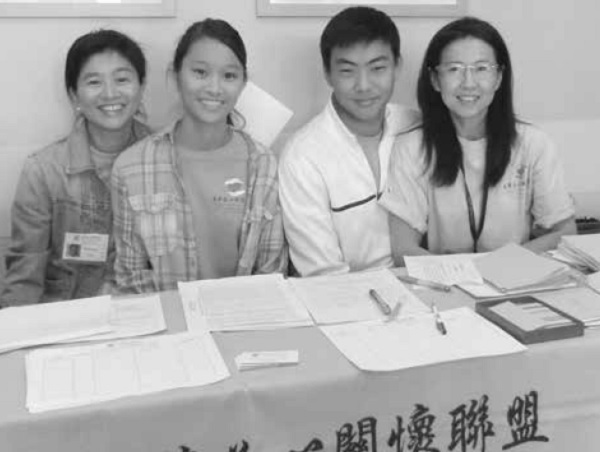
▲Zhao Rong (first from right)’s beloved son Eric (second from right) is only in grade 12 and has completed training to become a Vitas Health Care palliative care volunteer. Mother and son accompany patients walking in the valley of the shadow of death with bright smiles.
"Four Complete" hospice care
A 101-year-old multi-ethnic woman whom Zhaorong had been accompanying was suddenly transferred to a distant city. According to the service agreement, Zhaorong could no longer follow up, but she couldn't let go and agreed to continue serving until a replacement volunteer was found. So for four months, Zhaorong went to visit the old lady once a week. At the end of a long weekend on Friday, the old lady kept losing her temper for some unknown reason. As a result, Zhaorong discovered that her airbed was leaking, and her whole body sank into the bed, which was very uncomfortable.
Zhaorong thought that if she waited for a long weekend to deal with the problem, the patient would probably develop bedsores, so she made many phone calls to urge the problem to be solved. The repairman finally arrived in the middle of the night. When Zhou Zhaorong went to visit her the next day, she found that the old lady had developed a bedsore. Fortunately, it was not serious and she recovered quickly. Fortunately, the bed was repaired in time, otherwise the bedsores in such an aging patient would have worsened and invaded the bones.
Zhaorong deeply understands how important it is for terminally ill patients to work closely with all service personnel. She hopes that hospice care can receive more support from society in terms of manpower, funds and publicity, so that more patients can enjoy the blessings the end of life.
One day, Zhaorong saw a bouquet of flowers on the bedside of a patient. The name of the flower shop, Lori's Flowers, and a Bible verse were written on the card. Zhaorong's English name happened to be Lori, so she naturally told the patient: "Look at my name tag, my name is also Lori. This bouquet of flowers and the words on the card are sent to you by God. The Lord Jesus loves you!" He laughed.
The next week happened to be Mother's Day. Zhaorong thought that the patient's wife was working hard, so she baked the snacks with her own hands, packed them in a beautiful box, and prepared a beautiful card for him to give to his wife as a gift. His condition took a turn for the worse that day and he was very uncomfortable, but he understood Zhaorong's thoughts and was both moved and grateful. Two weeks later, he died.
Hospice care is different from end-of-life care that only focuses on snatching life time. It provides holistic care for the patient's body, mind, and spirit, fully reflecting respect for every life. Human life is not only about physical survival, but also about inner peace, spiritual freedom and return. This is quality life.
Family members caring for terminally ill patients are also full of hardships and are often physically and mentally exhausted. Hospice care also pays attention to the physical, mental and spiritual health of family members, cares for and accompanies them with empathy, and can even continue to provide long-term care to family members after the patient passes away. Thirteen months of grief counseling.
Palliative care is also a full-course process. When the patient can no longer take care of himself, family members, medical staff, social workers, spiritual counselors, etc., coordinate with each other in different positions and do their best to bring dignity, respect and enjoyment to the patient. A comfortable and peaceful end-of-life journey. This is exactly the "four comprehensive" care of the whole person, the whole family, the whole process, and the whole team that hospice advocates.
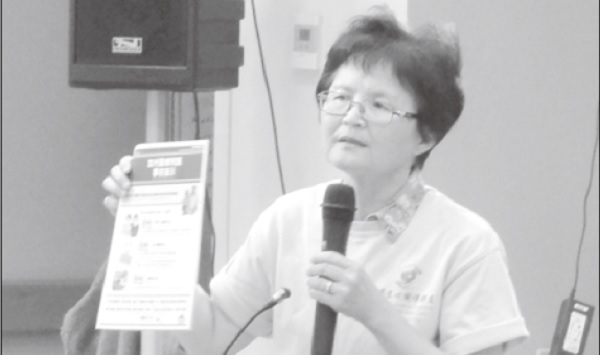
▲Ms. Chen Minghui, the founder of Meihua, explained the importance of the "California Advance Directive for Medical Care". She also introduced how to use the Safe Card and Safe Tea Room to open up topics for the media and achieve the purpose of planning medical care in advance.
Volunteers also receive medical treatment
Zhaorong never expected that after joining hospice care, her bereavement would be cured!
While receiving training in Meihua, Zhaorong understood that she had never cleared up the anger, bitterness, debt and other emotions she had accumulated due to her mother's death. During the training, she accepted her own limitations as a "human" and directly accepted Forgiveness and healing from God.
Zhaorong once went to Taiwan to attend a training course on children's hospice care, which made her understand that when her daughter was dying, everyone focused on the baby but ignored her, and even blamed her as a grieving mother. Zhaorong received God's words at the training site: "You should have been the object of love back then!" Zhaorong finally relieved the burden of having lost her daughter for many years, and her wounds were healed! There was a nurse at the training site who had the same name as Zhao Rong’s deceased daughter. Zhao Rong was so touched, as if God was telling her through this “coincidence”: “Jehovah God is with you!”
universal need
At present, it is extremely difficult to promote palliative care among overseas Chinese. Not only is there a serious lack of manpower and funds, but the biggest difficulty is overcoming people's psychological resistance. However, Zhaorong found that once people are willing to enter the hospice care promotion or training site, they will be full of curiosity and desire for hospice care, reflecting everyone's common need to live life well.
Meihua provides a popular "Safe Tea House" activity, and Zhaorong has led many events in California community Chinese associations, family gatherings, church sister groups, book clubs, etc. Participants reported that what they least expected was that they could talk about how to face death so happily, communicate their wishes so easily, and that death was not that scary. People also reported that they began to pay attention to things that were not prepared before death, learned to discuss the most meaningful things in life with their families, and chose the correct attitude towards death.
The Chinese community has a huge need for palliative care. Zhaorong has a wish, hoping to form a social movement to promote hospice care so that more Chinese people can receive blessings.
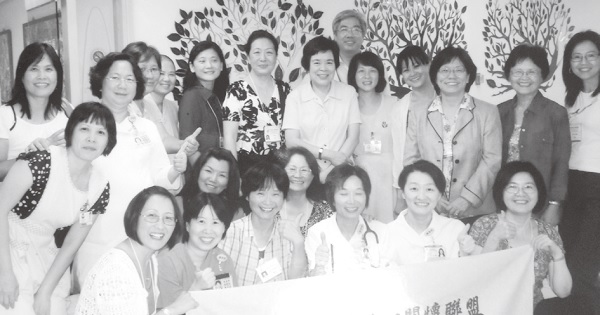
▲American-Chinese volunteers went to Taiwan for an exchange visit in September 2012. They took a group photo with Professor Zhao Keshi (standing, sixth from right) at National Cheng Kung University Hospital.
the power of faith
After participating in life care services for nearly five years, Zhaorong deeply felt that God is love. God taught her through His words how to love critically ill patients and their families who are fragile in body, mind and spirit.
The gospel of God’s redemption is not only spoken through words, but also preached through life and the love from God. In the dying stage when people need God the most, Zhaorong cries with the patients, laughs with them, touches their ailing bodies with her hands, and touches their long-lost souls with God’s love.
Every time before entering the ward, Zhaorong prays wholeheartedly for the patient, because she knows that healing and salvation come from God, and evil spirits can also come to disturb the patient; so she always prays to God to give him strength and protection, so that the patient can be healed and saved. Blessings continue to flow to patients who otherwise have no hope.

idea
Meihua's philosophy on the end of life is different from medical care that uses all means to prolong life, but leads to pain and prolongation of the death process. We believe that care is more important than cure, and symptom control and spiritual attention are more important than ineffective emergency medical measures.
American China supports the Natural Death Act and promotes palliative care based on comfort, tranquility, respect and dignity.
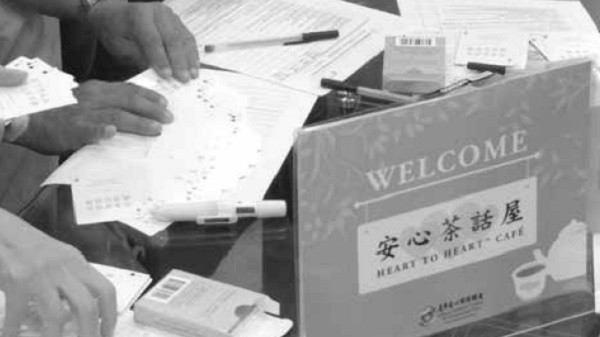
▲The peace of mind card is similar to a playing card, with 52 questions written on it, plus two "special wish cards", allowing people to think about end-of-life issues in a relaxing atmosphere of the game.
Service focus
‧Training medical professionals to serve the Chinese people
‧Train palliative care volunteers
‧Promote advance care plans
‧Community education and promotion
‧Translate and produce end-of-life education and resource materials
advance directives for medical care
(Advance Health Care Directive, AHCD)
Meihua designs and fully promotes the Anxin Card and Anxin Tea House. The reassurance card is similar to playing cards and is a communication tool for discussing end-of-life issues and promoting advance medical planning. It aims to help family members, caregivers and medical staff understand and know the patient's wishes for the end of life through dialogue; use games to facilitate communication on spiritual needs, financial arrangements, social relationships, physical needs and special wishes.
Anxin Tea House is a warm on-site communication and dialogue format that leads participants to discuss how to face the end of life and how to discuss advance medical plans with relatives and friends, thereby increasing their understanding of the things they need to face before death.
Sincerely invite to participate
American China has established cooperative relationships with more than 80 relevant organizations across the United States through an alliance model to expand education and outreach services to the Chinese community.
There is an urgent shortage of bilingual volunteers to serve the Chinese community. There are very few organizations in the United States that train bilingual volunteers. Those who are interested in participating in end-of-life care for Chinese people can go to the American-Chinese website (http://www.caccc-usa.org/) to learn more about training and alliance organizations.
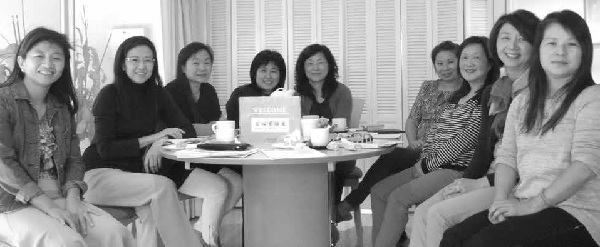
▲The "Safe Tea House" is a gathering where you can drink tea and talk about life and death issues. Let's think about how to ensure the quality of life and arrange funeral arrangements without regrets at the end of life.
Warmly recommended must-read articles and books - Recommended book lists by Zhao Keshi, Liu Xiaolin and Su Zhaorong
1. Viktor E. Frankl, "Living for Meaning—From Concentration Camps to Existentialism" (Man's Search for Meaning). Translated by Zhao Keshi and Shen Jinhui, Taipei, Kuang-Chi Culture, 2008.
2. Judy. Trudy Harris, RN, Glimpses of Heaven: True Stories of Hope and Peace at the End of Life's Journey. Translated by Lan Xiaolu, Taipei, Enlightenment Publishing, 2012.
3. Zhang Zhaosong, "Hospice care meets spiritual needs", "Christian Tribune"; http://www.ct.org.tw/1243878.
4. Yang Chengen, "He is always there!" ─Hospice care〉. Compiled by Ding Chunfang, "Holy Spirit" online magazine; http://www.joy.org.tw/file/holyspirit/382/200907-382-54.pdf; Issue 382 (July 2009): pages 54-57 .
5. Zhao Keshi, "Traveling with Peace". Taipei, Tianxia Culture, 2007.
6. Shen Yue et al., "Between Reluctance and Letting Go: Quietly Saying Goodbye". California, USA, Chinese Compassionate Care Alliance, 2013.
 Journalist profile Liu Xiaolin, now living in Vancouver, Canada, works full-time as a reporter for the magazines "True Love" and "Kingdom of God". He is happy and grateful for the light he finds in ordinary life every day, and looks to God more deeply for the hardships that have not yet been removed. Inspiration.
Journalist profile Liu Xiaolin, now living in Vancouver, Canada, works full-time as a reporter for the magazines "True Love" and "Kingdom of God". He is happy and grateful for the light he finds in ordinary life every day, and looks to God more deeply for the hardships that have not yet been removed. Inspiration.
Interviewee profile
Su Zhaorong graduated from the accounting department of a university and holds a Chinese Psychological Counselor license. She is currently a hospice care volunteer, a director of the American-Chinese Compassionate Care Alliance, a BSF international Bible study group leader, and a leader of the Genesis Word Training Book Club. Loves reading, music, nature, and enjoying the moments of encountering God in challenges.
